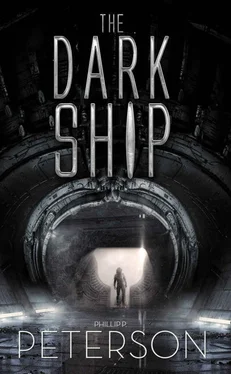Phillip P. Peterson
THE DARK SHIP
“Everyone to their stations. Ready for combat in five.”
Jeff flinched at his commander’s words and squeezed his eyes shut. He could feel the blood pulsing through his veins. His heart rate must be off the chart.
Now the shit’s going to hit the fan! Will I be dead or alive in twenty minutes?
He was clenching the armrest of his seat so tightly, his hands ached. Jeff forced himself to reopen his eyes. He studied the holoscreen in front of him—a message from the computer confirmed the ship’s systems were activated. Peeling one of his sweaty hands off the armrest, he reached forward to close the message. He was shaking so badly, he thought he might have a fever. Finally he managed to hit the small field on the touch screen.
I don’t want to die!
He had to get a grip. It wouldn’t help anyone if he lost his nerve now, least of all himself.
Jeff felt a steady hand on his shoulder. He turned and looked into Major Irons’ face. His commander was smiling encouragingly. “Relax. We can do this.”
Jeff took a deep breath and felt some of the adrenalin seep out of his body. If there was living proof that you could survive even the most dangerous mission, then it was Major George Irons. He was only thirty-eight years old, but his features were as weathered as an old man’s. The left side of his face was riddled with scars where the skin had been pierced by red-hot bits of metal when his ship was hit by a kinetic weapon three years ago. Another scar extended from his receding hairline across his forehead and ended somewhere under his black eye patch. An enemy’s knife had penetrated so deeply into the optic nerve that even the latest advancements in regenerative medicine had been no use.
During his training, Jeff had already noticed that his commander was a living textbook of what combat could do to a human body. The major had twenty years of experience behind him. He had fought as an infantryman on inhospitable planets before volunteering as a bomber commander for the Solar space fleet. He’d gone on to survive dozens of missions as, one by one, the majority of his friends and comrades had perished.
Jeff was incredibly grateful to the major for offering him reassurance even in a situation like this, and he forced himself to smile. Then he nodded weakly and turned back to his console. All he could see through the narrow windows was the darkness of hyperspace, but in a few minutes that would probably be replaced by a blazing hell.
“Captain Austin,” his commander began. “Would you please check the status of each station?”
Jeff took a deep breath. Of course: that was his job, and he’d trained for precisely this kind of situation in hundreds of virtual simulations. But even the best simulation couldn’t replicate the imminent prospect of a violent death.
He exhaled slowly and switched on his mic. “Final status check before start of mission. Confirm readiness for combat.” As hard as he tried to sound authoritative, Jeff couldn’t stop his voice from trembling. He expected to hear a snigger from Owens, who was sitting behind him with the other officers, but even he had better things to do right now than make fun of Jeff.
“Navigation?”
“All systems go,” Joanne Rutherford confirmed.
“Engineering?”
“Team in position. Systems ready to go,” Dave Green responded.
“Weapon systems?”
“Ready to kick ass!”
Jeff rolled his eyes. He was about to call the next station when the major, seating beside him, hit the talk button. “Respond in a proper fashion, Lieutenant Castle!” His voice was calm but icy.
Jeff thought he heard a gulp over the speaker. “Weapon systems ready.”
Jeff shook his head lightly and carried on. “Comms?”
“Ready.” Jeff heard the high-pitched voice of Edward Owens—known as Owl—behind him.
“Positioning?”
“Positioning systems ready!” Finni Herrmannsson’s voice reverberated over the speaker.
Jeff turned to his commander. “Sir, all stations ready for combat. And according to the computer, the ship’s systems are all in the green. The I.S. Charon is ready for action.”
“Good. Thank you. Computer: log entry for combat readiness at twelve thirty-eight UT. Exit from hyperspace on schedule in three minutes and twenty seconds.”
The commander flicked a switch on his console and then hit the talk button again. “Now we’re through with the formalities, let me say a few personal words.” Irons paused for a moment. “The Acheron system is sure to be well defended, so we’re likely to face resistance. At least we have five bombers, and they’ll have to divide up their defenses between them.”
Five ships! Jeff didn’t know whether to laugh or cry. There were up to a hundred bombers and additional escort fighters attacking other systems, but in this fool’s errand of a war, the Arkturus Sector was just a sideshow. But if a system’s defenses were stronger than predicted by military intelligence, then the entire attacking fleet might be obliterated before the bombers even stood a chance of reaching an entry point back into hyperspace. And there was no guarantee that this wouldn’t happen now, with Acheron.
“So,” Irons continued, “we will carry out our mission and do whatever it takes for our Quagma bomb to reach its target. Even if just one bomber makes it through, we’ll have gotten rid of this system and moved a little closer to victory against the Alliance. The sooner we finish this war, the sooner we can all go home.”
Jeff had his doubts it would be anytime soon.
“I expect every crew member to keep a level head and to give his or her best on this mission. If we don’t lose our nerve and work together, we’ll survive the next hour, complete our mission, and be able to celebrate tonight. The beers are on me.”
Jeff could hear a guffaw from behind him, but wasn’t sure if it came from Owens or Herrmannsson.
“Another one-and-a-half minutes till we enter the Acheron System. May God help us,” Irons concluded his speech.
“Check suits and close helmets.”
Jeff touched a blue field on the control panel on his left forearm. A green hologram appeared in front of his face and confirmed that his combat suit was ready for action.
The Mark VI suits were marvels of modern military technology. Flexible and soft, they adapted to every movement of the body. Breathable in a normal atmosphere, the fibers compacted in a vacuum so they could be used as space suits. When deactivated, the helmet was little more than a hood that you could hardly feel in the nape of your neck.
On his belt were a holster for his pistol and a separate pouch for various bits of gear, including his personal handheld computer.
Jeff touched another button and the hood inflated, wrapped around his head and connected to the narrow metal ring on his neck. A faint hissing indicated that the life-support system had been activated.
Jeff’s eyes were riveted to the clock on his console; his heart was pounding. He felt like he was counting down the minutes to his death—in slow motion, because time was moving unbearably slowly, as if they were in the vicinity of a black hole. There was nothing more to do or discuss. Everything was prepared. All they could do was wait and see what Acheron had in store for them when they left hyperspace.
The rumors flying around the officers’ mess over the last few days hadn’t escaped Jeff’s attention. Three bomber formations had disappeared—and never re-appeared—after taking off for bases in the Lambda Sector. There’d been speculation that the Alliance had developed a device to reliably predict the departure points of approaching combat units, and that the bombers were destroyed by a gravity mine as they left hyperspace. Jeff had dismissed the talk as gossip, but what if it were true? In that case, the end of the war was near, and Jeff was not on the winning side. But who gave a shit? He would be dead in a minute, anyway.
Читать дальше












